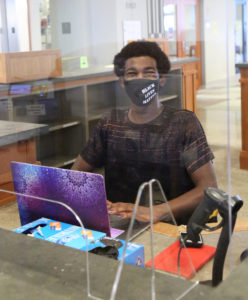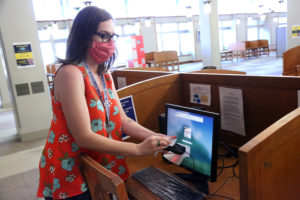The tech desk, part of the Innovation and Digital Learning department, has always been on the front lines of the Evanston Public Library’s service to the community. Located on the Main Library’s third floor, its team is tasked with assisting patrons in using the computers, printers, and other technological services available to them.
But beyond this role, the tech desk staff also help patrons tackle more general problems, connect to vital services, or even just talk things out when needed. Last year, the pandemic interrupted this important function of the team’s work, but now that things are back in person and health guidelines are gradually loosening, the tech desk is back and more needed than ever.

There’s not really a strict definition of the tech desk’s work. Chi Williams, a member of the team, said she and her coworkers play many different roles at their job depending on what patrons require.
“We kind of go between helping people with actual technological issues—with computers and printing and stuff like that—and listening to people talking,” Williams said. “Just being there to experience what they’re talking about in their lives. Because the library is a safe place for so many of these people, they’re able to unwind in a way that they might not otherwise.”
A Story from the Desk
A lot more goes on at the Library’s tech desk than you’d think—staffers help all kinds of people with all kinds of concerns on a daily basis. Here are a few of their stories:
Morgan Patten: There was this woman who asked me to proofread her resume and cover letter. And I thought, I have to help her with this. I can’t let her send this, it could be so much better. You could tell she had a lot of skills, she just didn’t know how to write this kind of document that does kind of require some specific knowledge.
And that’s part of what they’re gauging in a job interview for some positions: that you have the knowledge to write documents like that. Which makes it really limiting for people who might have really good skills or are really teachable, but they have never learned those skills before
So I just sat with her and we rehashed the whole thing. We redid her resume and helped her write her cover letter. It ended up being a really good experience, and you could just tell she was really, really grateful. She didn’t come back for help after that, so I hope she got the job.
The past year has been very difficult. Besides isolating individual members of the community, the pandemic also exacerbated the digital divide in Evanston. The barriers experienced by many to the vital digital services and resources so many of us take for granted are a huge problem, according to Heather Lindahl, another member of the team. Those without the internet, computers, phones, or other devices can be cut off from the rest of society. That’s why many of those affected by the digital divide use the free assistance that the tech desk provides. But sometimes it only feels like a temporary solution.
“Their experience of a technical problem is really just the tip of the iceberg of a much larger problem,” Lindahl said.
More and more, though, the Library is stepping into a bigger role in helping to bridge the digital divide. In providing Wi-Fi hotspots, job search take home kits, laptops, and more to those who need them, the tech desk is reaching out more than ever before to help strengthen the Evanston community and continue to connect the lives of those within it.
EPL Executive Director Karen Danczak Lyons said that it’s vital that we secure broadband connection, an essential resource these days, for all who require it and she says she’s been advocating for just that with partners like the City of Evanston and the school districts.
“With 43 million in new funds coming from the federal government, I’m hopeful we can pilot at least broadband improvements in specific areas of the City where they are needed,” Lyons said. “Broadband should be like any other utility. We expect our gas, electricity, and water to be there for us. The same is true of broadband. Especially in the pandemic, we’ve seen what happens when people are left disconnected.”
A Story from the Desk
Chi Williams: I had one patron whose sister passed over the course of the pandemic. They don’t know whether it was COVID or whether it was something else, but either way she’s passed now, and he’s been trying to figure out her funeral arrangements and have her will certified and all of these different specific things. And he tells me about it in bits and pieces every time that he comes in, because each time I’m helping him do the thing that he needs that day—whether it’s printing something out, signing it, scanning it and sending it back to his lawyer, or just him writing a eulogy for his sister and I get to read it. And I see what a beautiful person she was and how much he cherished her. I still have a copy of her eulogy. The fact that he told me to keep a copy and the fact that he cares enough to keep telling me about the situation…it’s nice to be a part of his life, even if it is in this one way.

Heather Lindahl, who works with Williams, said that there’s much more to the job than meets the eye, and the interpersonal aspect—connecting with patrons and lending an ear when needed—is a big part of the role.
“At the tech desk, we’re kind of like bartenders a little bit,” Lindahl said. “There’s no alcohol, but people will come and socialize with us.”
And because of that special, front-line connection, Lindahl often sees the community at its most vulnerable moments. She has several stories of times when she’s helped people in difficult situations or people struggling with tough mental or physical health conditions. Now, the tech desk is well-equipped with juice, snacks, and other resources to help ease these situations if they arise.
The tech desk is a very important mediator between the Library and the patrons it supports. However, it’s been difficult to maintain that relationship over the past year of the pandemic. When the Library wasn’t open, tech workers lost the benefit of face-to-face contact due to social distancing measures. They were able to provide the assistance patrons needed, but only remotely. All that changed when the Library opened up in the summer of 2020, returning as a space where Evanstonians could receive in-person support, even though conditions were still abnormal.
After this change occurred, it mattered a lot to patrons simply that the Library was open for them at all after a difficult year of closed doors everywhere. For the most part, people are just happy to have someone there to help them.
Kenneth McCane, a regular visitor who is very familiar with the staff at the tech desk, said that the service he receives at the Library is really something special.
“Everyone has been very cordial,” McCane said. “And through the pandemic, so many people, including me, were isolated at home all the time. To be able to leave home and come here for business or whatever and have polite people have a kind word to say…you just don’t get that everywhere.”
Especially during this past year, McCane said, the assistance the tech desk staffers have provided and their presence in the building has been a benefit to many. It’s their reliability, stability, and quality that keeps him coming back.
A Story from the Desk
Heather Lindahl: I had a patron who didn’t know how to get any of the stimulus checks. He said he hadn’t gotten any and he was sick, immunocompromised, very low energy, just struggling with the system. So I found a person to help him—at Truman college there’s a free program through Ladder Up. There was exactly one appointment available, and I booked it for him.
He went and he got all this stimulus money and every single time he comes (now)—this was like a month ago—he’s like, ‘My life is so much better now, thank you so much.’ I appreciate his gratitude, but I know that he’s the only person I was able to do that for, because they only had one appointment. And so many people just don’t have the capacity to jump through all the hoops.
I see a lot of how the systems that we interface with technologically, the places where they intersect create real barriers for people. It’s an interesting vantage point that I have. I think the people who are experiencing these problems often blame themselves, they blame themselves for not being tech savvy enough, and the places that are causing the problems don’t understand how their systems interact with other systems. And so they’re oblivious that these problems are occurring.
The role of the tech desk may grow in the future. Morgan Patten, who recently joined the desk’s team, said that expanding the team’s educational initiatives and promoting digital literacy among adults could be a promising path forward for the Library.
“There is so much more that we offer at this desk, besides just getting someone on a computer,” Patten said. “And there’s definitely so much potential and room to grow for this department.”
Patten said that the desk is also experimenting with ways to create programs that engage and assist underserved patrons, including those experiencing homelessness. Helping people in tough situations connect to resources or employment opportunities is an especially impactful function of the desk, according to Patten.
Lindahl said that the tech desk’s work is vitally important. Beyond providing day-to-day assistance, bridging the digital divide can have a transformative effect on the lives of so many.
“Life changing things happen for people when they can get online and get their stuff done and access employment, or social security benefits, or their stimulus checks, or their unemployment checks,” Lindahl said. “There are just so many doors to unlock that you need technology to unlock.”
